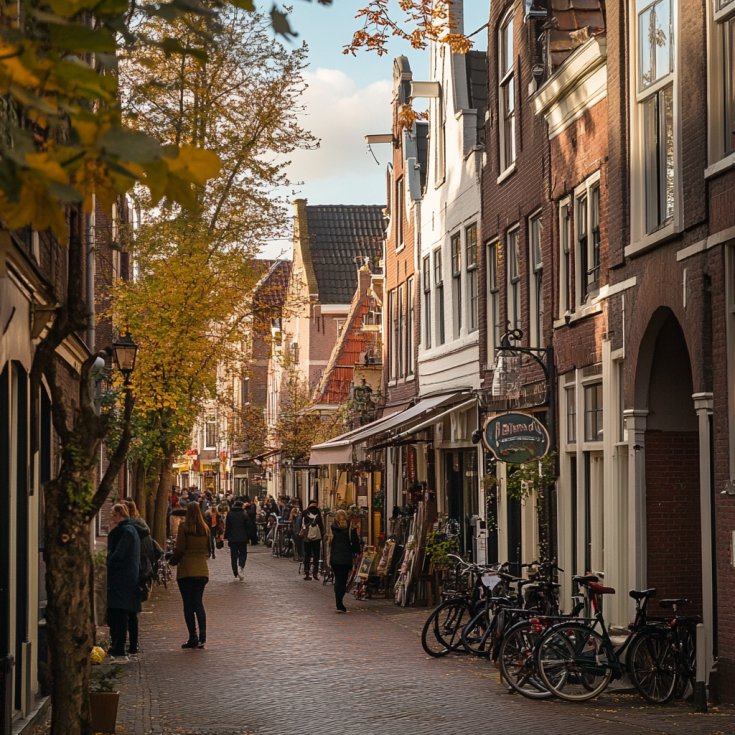Social safety: local approach to reduce crime and enhance neighbourhood liveability

Heerlen is a city of 90,000 inhabitants in the southeast of the Netherlands, just across the border from Aachen (Aix-la-Chapelle). It is part of the Parkstad Limburg City Region, which is home to 250,000 persons.
For many years, living in this city, and particularly in its northern neighbourhoods, has come with a certain unease for residents like Johan, a long-time inhabitant in the northern part of the city. He remembers a time when the streets felt different—quieter, more secure. But in recent years, that sense of safety has diminished. Walking home from work in the evening, Johan often feels uneasy, noticing groups gathering on street corners and occasional signs of drug activity. He’s heard stories from neighbours about break-ins and vandalism, and sometimes, the sound of sirens at night disturbs the stillness.
Johan isn’t alone in feeling this way. Many people in Heerlen share growing concerns about crime and violence. Most crime rates are considerably higher than the national average. For offences linked to drugs, crime rates in Heerlen are actually higher than in large cities such as Amsterdam and Rotterdam. Heerlen still struggles with higher-than-average rates of drug-related offences, illegal weapon possession and bodily harm. Johan’s sense of unease isn’t just imagined—it’s reflected in the numbers.
Yet despite these challenges, Johan has noticed a shift. Over the past years, the local police, social workers and educators have engaged more actively with residents. They have been working hard to build trust and a sense of community. They organise regular meetings to discuss safety concerns and help people feel heard. They visit people at home more systematically. This, Johan realises, is part of a broader effort by the city to tackle the root causes of insecurity and crime.
New principles for local intervention, based on intensified cooperation between public actors, rapid interventions and restoration of trust
In response to the rising crime rates and growing feelings of insecurity among residents like Johan, Heerlen Municipality, lead partner of the Interreg Europe project CITICESS, has implemented policies and initiatives aimed at addressing the root causes of these issues. The city's approach is multi-faceted, focusing not just on law enforcement but also on strengthening social cohesion and addressing underlying social problems such as poverty, substance abuse, and inadequate housing conditions.
One of the key pillars of Heerlen's strategy is the Social Safety Approach, a comprehensive initiative designed to foster safety by addressing both physical and social factors. This programme aims to create a safer environment by involving residents directly in the process of change. By building stronger connections between the community and local authorities, the city is working to restore a sense of trust that has long been eroded.
Local officials, social workers, and healthcare professionals have also been deployed to engage more closely and in a more coordinated way with the population, particularly in northern neighbourhoods where Johan lives. This approach focuses on early intervention, identifying and addressing problems before they escalate into more serious issues such as crime or violence.
A multilevel governance approach to social safety
Concretely, this implies that the Municipality established a ‘Social Safety and Neighbourhood Management team’ with more than 55 employees. It works broadly in the fields of quality of life, safety, citizen involvement, participation and social and physical quality in the neighbourhoods of Heerlen. The Intervention Team that was established in September 2022 can react quickly when needed. This helps set clear boundaries and standards and makes it obvious to all that ‘rules are made to be followed’.
These developments are the outcome of concerted efforts of authorities at different levels over many years. The National Programme for North Heerlen has been running for 25 years as one of 20 locally targeted initiatives under the 'National Liveability and Safety Programme'. It actively promotes new forms of cooperation between public and private actors. The Parkstad Limburg City Region is actively involved in addressing housing challenges, in dialogue with the numerous housing associations.
The Municipality of Heerlen still has many challenges to overcome. Efforts to optimise synergies between public actors, establish dialogue and trust with the population and multi-stakeholder cooperation make it possible to address crime and insecurity issues more effectively.